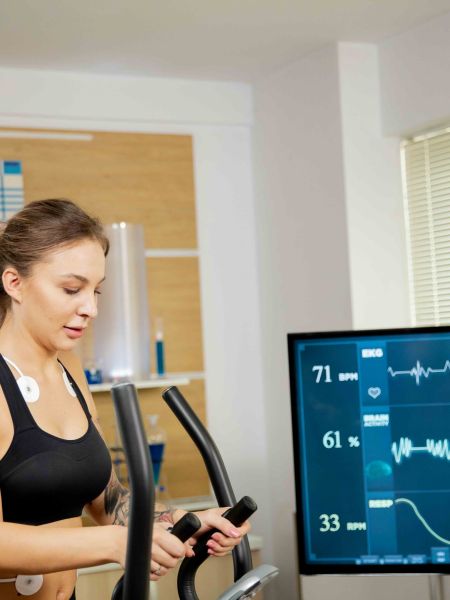A Woman's Guide to Hacking Hormones for Vitality: Look and Feel Your Absolute Best!
Your guide to hacking your hormones for longevity and vitality.
Here's the thing ladies, your hormones play a crucial role in how you look and feel each day. If it's not your best, it's true that your hormones are probably to blame, but it IS possible to master your cycle and hack your hormones, so you can look and feel like the rockstar you are!
For far too long, women's hormonal health has been inadequately addressed and frequently misunderstood, leaving many women feeling isolated and resigned to suffering in silence. It's time to open the conversation: you don't have to struggle silently, and you deserve to feel amazing. By understanding and optimizing your hormonal health, you can unlock a newfound vitality.
We pulled from many different sources to construct this article, but most notably the work of Harvard-trained medical doctor, and New York Times Best Selling Author: Dr. Sara Gottfried, as well as hormonal biologist, biochemist, functional nutritionist, endocrinologist, neuropsychologist, and founder of Flo Living (Women's Health App): Alisa Vitti.
Hacking your hormones is a superpower, and we want to give you the key. Let's dive in!
What Are Hormones, and How Do They Affect Women?
Hormones are chemical messengers in the body that regulate and control development and affect many daily functions and life milestones.
For women in their reproductive years (1st menstrual cycle to their last), they are ruled by two bodily rhythms — their circadian rhythm (24-hour day) and their infradian rhythm (28-day cycle). If you've never heard of your 28-day infradian rhythm, you are in the vast majority of women on this planet.
Disappointed that we lack this education from an early age onwards is an understatement, but the founder of Flo Living: Alisa Vitti believes we're on the cusp of a revolution in Women's Health, and it's going to revolve around working with and not against your infradian rhythm so you can holistically balance your hormones and feel amazing. There's an incredible podcast you can listen to that takes a deep dive into this subject here.
Flowing with your infradian rhythm will holistically balance your hormones, so you can feel and look your best!
The Overlooked Importance of Hormonal Health
Many women resort to hormonal birth control to manage hormonal symptoms rather than for its intended purpose of contraception. This approach often masks underlying issues without addressing the root cause. Andrew Huberman and Dr. Sara Gottfried explore this topic amongst a sea of other fascinating hormone topics in this Female Hormone Health for Longevity and Vitality Podcast.
While taking hormonal birth control does have some benefits, it should be used for its intended purpose (contraception), and not be used as a means to treat hormonal issues, says Dr. Gottfried.
A deeper understanding of the infradian rhythm and female menstrual cycle is essential for a woman's holistic health and well-being.
Understanding the Infradian Rhythm
Unlike men, whose hormone cycle operates on a 24-hour circadian rhythm, women also have an infradian rhythm (their menstrual cycle). This rhythm spans approximately 28 days and governs six key systems of the female body including their monthly cycle, brain function, metabolism, microbiome, stress-response system, and reproductive system.
From the first bleed to the last, women essentially operate with two biological clocks for four decades. — Alisa Vitti
Caring for your infradian rhythm can significantly enhance your overall well-being. Disrupting this rhythm, on the other hand, can lead to a host of health issues.
The Female Menstrual Cycle: Four Phases
Understanding the four phases of the menstrual cycle—follicular, ovulatory, luteal, and menstrual—is crucial for optimizing hormonal health. Each phase brings unique changes to your body, affecting metabolism, energy levels, and overall well-being.
Follicular Phase (Days 1-14)
The follicular phase begins on the first day of your period and lasts until ovulation. This phase can be broken down into the menstrual and pre-ovulatory stages.
Menstrual Stage (Days 1-5): This is the bleeding phase when the uterine lining sheds. Energy levels might be lower, and it's important to allow your body to rest and recover. Light activities such as yoga or gentle walks are ideal.
Pre-ovulatory Stage (Days 6-14): As your period ends, your body starts preparing for ovulation. Estrogen levels rise, leading to increased energy and improved mood. This is a great time for high-intensity workouts and focusing on demanding tasks.
Ovulatory Phase (Days 15-17)
Ovulation occurs mid-cycle when a mature egg is released from the ovary. This phase is characterized by a peak in estrogen and a surge in luteinizing hormone (LH).
Energy Levels: High
Exercise: High-intensity workouts are beneficial. Your body is primed for activities that require strength and endurance.
Mental Clarity: Enhanced cognitive function and communication skills.
Luteal Phase (Days 18-28)
The luteal phase begins after ovulation and lasts until the start of your next period. This phase is further divided into early and late luteal stages.
Early Luteal Stage (Days 18-23): Progesterone levels rise, stabilizing mood and supporting pregnancy if conception occurs. Moderate exercise and balanced nutrition are key.
Late Luteal Stage (Days 24-28): If pregnancy does not occur, hormone levels drop, leading to premenstrual symptoms (PMS). Metabolism speeds up, and you need an additional 274 calories per day. Opt for low-intensity exercises like pilates or long-hold yoga to avoid cortisol spikes.
Menstrual Phase (Days 1-5)
The cycle restarts with the menstrual phase. This phase can bring about cramps, fatigue, and mood fluctuations.
Energy Levels: Low
Exercise: Gentle activities like stretching and light walks are recommended.
Self-care: Prioritize rest, hydration, and nourishing foods.
The Cycle Syncing Method
Alisa Vitti created the Cycle Syncing Method, which involves aligning your diet, exercise, and even your work tasks with your menstrual cycle. While men have long optimized their daily routines around their 24-hour circadian rhythm, women can benefit from syncing with their monthly cycle.
First Half of the Cycle: Follicular and Ovulatory Phases
Metabolism: Slower
Caloric Intake: Fewer calories needed.
Cortisol Levels: Lower
Exercise: High-intensity workouts like HIIT and spinning are beneficial, promoting lean muscle development and cardiovascular endurance.
Second Half of the Cycle: Luteal and Bleeding Phases
Metabolism: Faster
Caloric Intake: You should be eating 274 more calories per day during this half of your cycle.
Cortisol Levels: Higher
Exercise: Low-intensity workouts are optimal to prevent fat storage and muscle wasting.
The U.S. Women's Soccer Team is already leveraging the infradian rhythm to enhance their training.
The Cycle Synching approach could herald a revolution in women's health care, emphasizing personalized health strategies and hormonal balance.
Sleep and Hormonal Health in Women
Sleep plays a crucial role in maintaining hormonal balance, and women, due to their unique hormonal cycles and brain structure, have specific sleep needs that differ from men. Adequate sleep is essential for regulating the infradian rhythm, and disruption in quality ZZZ's can significantly impact hormonal health.
Women Need More Sleep
Research indicates that women require more sleep than men. This increased need is linked to the different, and complex structure of the female brain, which undergoes significant changes throughout the menstrual cycle. Ensuring sufficient sleep helps maintain cognitive function, emotional stability, and overall health.
Impact on Hormonal Balance
Adequate sleep is vital for regulating the hormones that control the infradian rhythm. Lack of sleep can lead to imbalances in key hormones such as estrogen and progesterone, exacerbating symptoms of PMS and PMDD, increasing stress levels, and impairing overall health. Sleep deprivation can disrupt the delicate balance of hormones, leading to issues such as:
Increased Cortisol Levels: Elevated cortisol (the stress hormone), can interfere with other hormonal processes, leading to weight gain, mood swings, and reduced immune function.
Insulin Resistance: Poor sleep can affect insulin sensitivity, increasing the risk of developing conditions like PCOS (polycystic ovary syndrome) and diabetes.
Impaired Reproductive Health: Chronic sleep deprivation can impact fertility and menstrual regularity, affecting overall reproductive health.
Sleep Quality and the Menstrual Cycle
The menstrual cycle can influence sleep quality, with fluctuations in hormone levels affecting how well women sleep. For instance, rising progesterone levels in the luteal phase can cause sleep disturbances, while the drop in hormone levels before menstruation can lead to insomnia. Recognizing these patterns can help women adjust their routines to promote better sleep and ultimately net better rest overall.
Strategies for Better Sleep
We've got an entire Goal dedicated to Improving Deep Sleep, but you'll find some helpful quick tips below.
To optimize hormonal health through better sleep, consider the following strategies:
Establish a Sleep Routine: Consistency is key. Going to bed and waking up at the same time every day helps regulate your internal clock.
Create a Sleep-Conducive Environment: Ensure your bedroom is cool, dark, and quiet. Invest in a comfortable mattress and pillows and create a peaceful sanctuary for optimal rest. If your room stresses you out, you're not going to get good sleep. If your room feels calming and cozy, you're a lot more likely to get quality ZZZs.
Limit Caffeine and Alcohol: Both substances can disrupt sleep patterns, especially if consumed close to bedtime.
Practice Relaxation Techniques: Incorporate practices such as deep breathing, meditation, or gentle yoga to relax your body and mind before bed.
Monitor Your Cycle: Pay attention to how different phases of your menstrual cycle affect your sleep. Adjust your schedule and environment accordingly to support better sleep quality.
Synch Sleep With Partner: Studies show that synching your sleep schedule with your partner could ultimately get you better rest.
Crafting a Woman's Optimal Day
Your optimal day doesn't have to follow a rigid structure; instead, listen to what feels best for your body at any given moment.
Research shows that the female brain changes structurally by a large percentage over the course of a month, which is bound to have an effect on your mental and physical health.
Balancing your hormones can significantly improve your quality of life. However, life's demands sometimes necessitate working out of sync with your cycle. While this is occasionally unavoidable, chronic misalignment can lead to increased anxiety, depression, and overall struggle. The more you can work with and not against your cycle, the better!
Diet and Women's Hormonal Health
The Foundation for Female Health Awareness says diet is a fundamental aspect of maintaining hormonal balance and overall health. We've summarized some key points below. Essentially, you are what you eat, and what you eat can significantly impact the way your body produces and regulates hormones. Understanding how to nourish your body in sync with your menstrual cycle can lead to optimal hormonal health.
The Impact of Diet on Hormonal Balance
Research shows the foods you consume provide the building blocks for hormone production.
A diet rich in whole foods, healthy fats, and balanced nutrients supports the endocrine system and helps maintain stable hormone levels. Conversely, a diet high in processed foods, sugars, and unhealthy fats can disrupt hormonal balance and contribute to various health issues.
Nutritional Needs Throughout the Menstrual Cycle
Your nutritional needs vary throughout the different phases of your menstrual cycle. By adjusting your diet to align with these phases, you can support your body's changing requirements and promote hormonal harmony. You should also consider Seed Cycling to regulate your cycle.
Follicular Phase (Days 1-14):
Focus: Nutrient-dense, energy-boosting foods.
Foods: Lean proteins, leafy greens, nuts, seeds, and complex carbohydrates.
Benefits: Supports rising estrogen levels, boosts energy, and prepares the body for ovulation.
Ovulatory Phase (Days 15-17):
Focus: Anti-inflammatory and antioxidant-rich foods.
Foods: Berries, avocados, fatty fish (like salmon), and cruciferous vegetables (like broccoli and cauliflower).
Benefits: Supports peak hormone levels, enhances egg release, and reduces inflammation.
Luteal Phase (Days 18-28):
Focus: Calorie-dense, magnesium-rich foods.
Foods: Dark chocolate, bananas, whole grains, and leafy greens.
Benefits: Supports increased progesterone production, reduces PMS symptoms, and stabilizes mood.
Menstrual Phase (Days 1-5):
Focus: Iron-rich and anti-inflammatory foods.
Foods: Red meat, spinach, lentils, and ginger.
Benefits: Replenishes iron lost during menstruation, reduces inflammation, and supports overall recovery.
The Role of Specific Nutrients
Certain nutrients play pivotal roles in hormonal health. Ensuring an adequate intake of these nutrients can help maintain balance and alleviate common hormonal issues.
Embrace Your Unique Rhythm
While there's no magic supplement you can take to balance your hormones, you can hack your cycle to optimize your hormonal health. By honoring your infradian rhythm, you can bypass many health issues, all while looking and feeling your absolute best. It's time to revolutionize women's health care, starting with understanding and optimizing our hormonal health. You deserve to feel vibrant, healthy, and empowered every single day!




